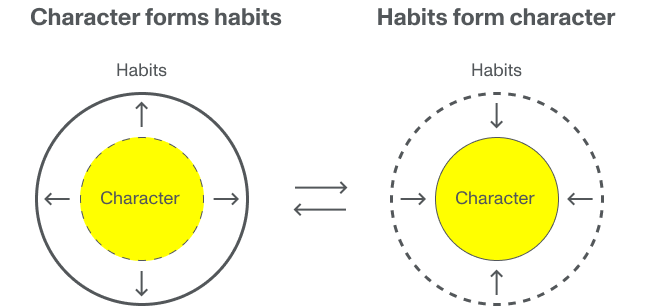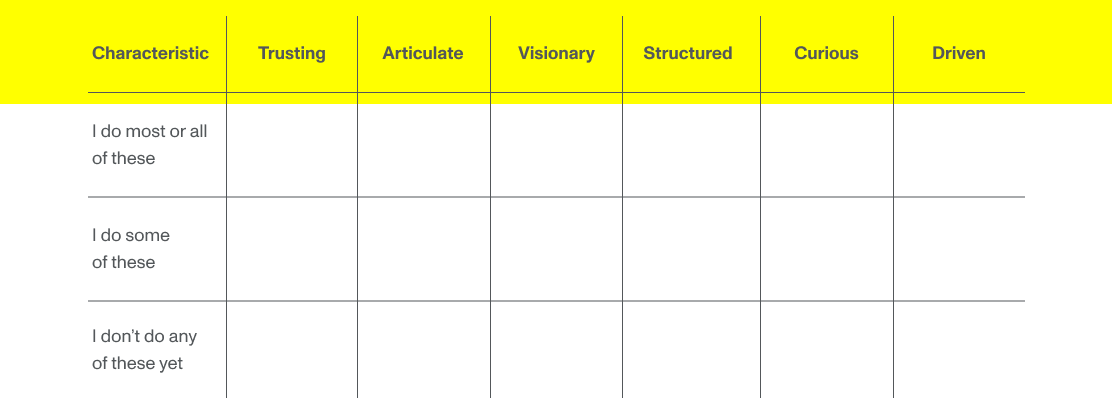By Luke Gallimore, Head of Product Management, Monstarlab
As the new year arrives, we all start to reflect on the year past, both personally and professionally. New-year-resolutions are made to help us improve ourselves and make better decisions this year.
It’s no secret that making seemingly small — but consistent — decisions about your day-to-day behaviour can lead to large and meaningful changes in your life and character. It is a form of training by repeating habits.
To be a better product manager and make meaningful change and impact in your product, you need to focus on your habits too.
“Small drops and finally a flood”
― Unattributed Tamil Quote
Success as a Product Manager
Most people’s measurement of results and achievements are retrospective assessments against the goals they set themselves. Most products are also managed in a time-bound and goal-oriented way. Retain X more users, increase downloads by Y, convert Z more sales. So a great product manager is often defined as one who achieves their goals.
A great mountaineer is one who summits. But what does it take to climb the mountain?
By measuring in this retrospective way, we often forget or ignore what it takes to actually get there. Completion of goals comes from a build-up of the right kinds of actions and decisions. But this leads us to another question.
Where Do Actions and Decisions Come From?
It is your character or your values, which are most powerful in directing actions and decisions (for the same reason, value-based product strategies are more effective in the long term than goal-based product strategies; they are better at directing small actions and decisions).
People with stronger characters and values make better decisions, more consistently, and achieve their goals more often.
This is also why — when I am hiring for a product manager — I focus very closely on character. Experience is important, but character is a more reliable future indicator of action when things get tough.
So to be a great product manager you need to have the right character and values. From this, good habits will form. And the more good habits you perform, the stronger your character becomes. This cycle of action reinforcing character, and character reinforcing action is not a new idea.
“For the things we have to learn before we can do them, we learn by doing them.”
― Aristotle, The Nicomachean Ethics (350 B.C.)

Character and habits reinforce each other
Great products are not built overnight. Neither are great product managers.
Habits of Great Product Managers
Below is a summary of these characteristics and a few examples of habits which reinforce them (this is by no means an exhaustive list, and things vary with context).
- Trusting
- Articulate
- Visionary
- Structured
- Curious
- Driven
How do you develop these characteristics? The answer is through habitual practise of good actions and decisions.
1. Trusting
“Let others get on with work in their area of expertise; step in only when needed.”
To be a successful product manager, you have to be part of the team. This means that you are a facilitator, not a dictator. If you are lucky enough to be surrounded by talented people, it is your responsibility to amplify that talent. You can do this by being more trusting.
Examples of useful habits:
- Never override a decision from an expert without discussing it openly first
- Always listen to your team and ask questions to understand their point of view
- As much as you can, rely on experts to help inform your perspective and minimise bias
- If you do not know the answer then ask for help
2. Articulate
“Able to manage diverse stakeholders, lead a constructive debate, and see both sides of an argument.”
To be a successful product manager, you have to communicate ideas effectively. This means that you are able to listen intently, understand complex ideas and to communicate them to others too. You can do this by being more articulate.
Examples of useful habits:
- Never make the mistake of attacking a person instead of their idea if you disagree with them
- Always see ideas with an open mind and digest them fully before responding with your own
- As much as you can, explain how your ideas are rooted in evidence and where they come from
- If there is a disagreement then embrace it, and allow open discussion in the team
3. Visionary
“Acts as the leader of an idea and rallies people; focused on the long-term and the big picture.”
To be a successful product manager, you have to bring people on a journey and inspire them. This means that you make decisions for a better tomorrow, not an easier today. You can do this by being more visionary.
Examples of useful habits:
- Never let your product strategy stagnate and become out of date through lack of use
- Always include the team in definition of your north star to ensure buy-in
- As much as you can, communicate the product vision to all stakeholders
- If there is a lack of belief in an idea then always try and understand reservations and concerns
4. Structured
“Maintain a critical view on processes. Be ready to define new ways of working and refine existing ones. Be highly organised.”
To be a successful product manager, you need to maintain order and routine whilst remaining flexible. This means constantly having a critical eye on the way things are done, whilst building frameworks and tools for the team. You can do this by being more structured.
Examples of useful habits:
- Never start using a new process which has not been researched and thought through
- Always question why we do things the way we do and ask the team for feedback regularly
- As much as you can, simplify processes and ways of working to achieve efficiency
- If a process is not working then change it or stop doing it
5. Curious
“Solve problems using evidence and get to the right answer quickly; question the status quo but leave your ego at the door.”
To be a successful product manager, you have to be driven by data and make decisions based on current knowledge. This means you need to proactively seek out more information where it is needed and apply it appropriately. You can do this by being more curious.
Examples of useful habits:
- Never assume that your opinion is correct or more valuable than anyone else’s
- Always use as much evidence as necessary; the more important the decision, the more evidence is needed
- As much as you can, stay abreast of industry (and relevant out-of-industry) trends and news
- If new evidence comes to light then adjust your opinions accordingly (this is always happening, whether you notice it or not!)
6. Driven
“A self-starter who drives their own workload and takes the initiative to challenge themselves and others.”
To be a successful product manager, you need to take charge of your work and inspire others to do the same. This means proactively seeking out ways that you can add more and more value. You can do this by being more driven.
Examples of useful habits:
- Never shy away from the difficult option if you know it is the right one
- Always seek opportunities to take on more responsibility and work
- As much as you can, challenge others to push themselves out of their comfort zone
- If you feel that you can take on more work then ask how you can help others in the team
Create Your Own Plan
What behaviours do you recognise in the habits above? Which ones are you not doing?
You should have a good idea after reading this article of which characteristics are your strengths, and which provide an opportunity for you to develop as a product manager.

Complete this table to create your own plan
For each of the characteristics, put a cross where you think you are and note down how many of the habits you are currently doing regularly. Take your lowest scoring characteristics and pick out some specific habits that you can foster to reinforce those characteristics.
For those characteristics in which you were strong, ask yourself, “what more can I do here?” Also, ask how these habits can be a springboard to develop other areas.
The habits I have mentioned above are, of course, only illustrative. What other habits do you think are important for these characteristics? I would love to hear your thoughts in response to this article.
Even if you do not see many of these habits in yourself right now, that does not mean you cannot be a great product manager. With consistent, small steps in the right direction, you can make big change happen.
Here’s to a great 2021.
Key Takeaways
- Making seemingly small — but consistent — decisions about your day-to-day behaviour will lead to large and meaningful changes in your life and character.
- It is your character that is most powerful in directing actions and decisions
- From the right character, good habits will form. And the more good habits you perform, the stronger your character becomes.
- People with stronger characters and values make better decisions, more consistently, and achieve their goals more often.
- Pick out some specific habits that you can foster to reinforce those characteristics of great product managers.



